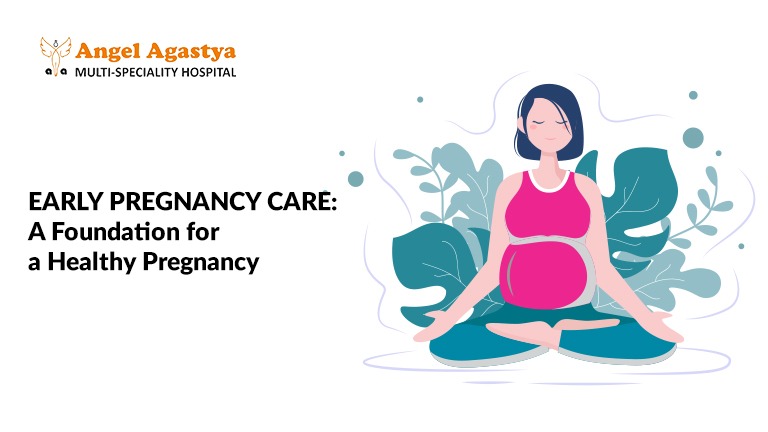Early Pregnancy Care: A Foundation for a Healthy Pregnancy
Introduction
The moment you find out you’re expecting is life-changing. As exciting as this journey is, ensuring you take the right steps early is critical for a healthy pregnancy. Early pregnancy care is about laying the foundation for not only your health but also the health and well-being of your baby. This comprehensive guide will walk you through the importance of early pregnancy care, essential tests, screenings, and how to handle common pregnancy concerns.

Getting the proper care right from the start can be the key to a smooth pregnancy. And this guide will help you set that strong foundation. Let’s dive into what you need to know about early pregnancy care, so your journey to motherhood is as fulfilling and healthy as possible.
Establishing a Healthy Foundation

Prenatal Check-ups
Regular prenatal check-ups should be one of the first steps you take when you discover you’re pregnant. These appointments allow your healthcare provider to monitor your baby’s growth, track your health, and detect any early signs of complications. Whether measuring your baby’s development or answering your pressing questions, these visits are essential.
Early Detection of Risks
Early pregnancy care is not just about check-ups but also about identifying potential risks. Early detection of issues like gestational diabetes, preeclampsia, or preterm labor can allow for timely intervention. It improves your chances of having a safe pregnancy and healthy delivery.
Personalized Care Plan
No two pregnancies are alike. Your healthcare provider will craft a personalized care plan based on your medical history and unique needs. This plan will guide you through essential tests, screenings, and any other necessary medical interventions, ensuring the best outcome for you and your baby.
Essential Tests and Screenings

Blood Tests
Blood tests are an integral part of early pregnancy care, assessing your health and ensuring your baby is developing properly. You may undergo the following tests:
- Blood type and Rh factor: Ensures your blood type compatibility with the baby’s.
- Complete blood count (CBC): Checks for anaemia or other blood disorders.
- Blood sugar levels: Monitors for gestational diabetes.
- Thyroid function tests: Ensures your thyroid is functioning properly.
- Infections: Tests for conditions like HIV, hepatitis B, and hepatitis C.
Ultrasound Scans
Ultrasound scans during the early stages provide a clear image of your baby’s growth. They confirm the due date, check for abnormalities, and examine the health of your placenta. Regular ultrasound checks ensure everything is progressing smoothly.
Genetic Screening
Your doctor might offer genetic screening to check for any risk of genetic conditions in your baby. These screenings can identify conditions like Down syndrome or other chromosomal abnormalities, giving you peace of mind or time to prepare.
Addressing Common Pregnancy Concerns

Morning Sickness
Morning sickness, although a common symptom, can be very uncomfortable. Many women experience nausea and vomiting, especially in the first trimester. Eating smaller, frequent meals, staying hydrated, and avoiding food triggers can help reduce symptoms. Always consult your doctor if the symptoms are severe or persist.
Fatigue
The hormone changes in early pregnancy can make you feel extremely tired. It’s essential to listen to your body—get plenty of rest, avoid over-exerting yourself, and remember that fatigue is your body’s way of telling you to slow down.
Weight Gain
Gaining the right amount of weight during pregnancy is important for both your health and your baby’s. Your healthcare provider will give you guidelines on how much weight you should gain based on your pre-pregnancy weight and your overall health.
Common Pregnancy Symptoms
In addition to morning sickness and fatigue, you might experience breast tenderness, frequent urination, constipation, and mood swings. Each of these symptoms is a natural part of pregnancy, and your healthcare provider can help you find ways to manage them effectively.
Medications and Supplements

Safe Medication Use
During pregnancy, it’s critical to be cautious about medications. Some over-the-counter drugs, herbal supplements, or prescription medications may not be safe for your baby. Always talk to your healthcare provider before taking any medication.
Essential Supplements
Prenatal vitamins, especially those containing folic acid, iron, and calcium, are necessary to support your baby’s development and your health. Your healthcare provider will recommend supplements based on your specific needs. Folic acid, in particular, is vital in preventing neural tube defects in your baby.
Preparing for Childbirth

Childbirth Classes
As your due date approaches, consider attending childbirth classes. These classes cover a range of topics, from labor and delivery to newborn care and pain management techniques. This knowledge helps to reduce anxiety and prepare you mentally and physically for the big day.
Creating a Birth Plan
Your birth plan is a detailed outline of your preferences for labor and delivery, including pain relief methods, who will be present during birth, and what kind of post-birth care you’d like. Communicate these preferences with your healthcare provider so that everyone is on the same page.
Hospital or Home Birth
Whether you choose a hospital or home birth, it’s crucial to weigh the pros and cons of both options. Discuss with your healthcare provider to decide which environment best suits your needs and medical history.
Conclusion
Early pregnancy care sets the stage for a healthy and successful pregnancy. By attending regular check-ups, undergoing essential screenings, and addressing common concerns, you build a strong foundation for your baby’s development. Don’t forget to consult your healthcare provider at every step, and confidently prepare for childbirth. Your journey to motherhood is just beginning, and early pregnancy care will ensure it is a safe, joyous, and rewarding experience.
Frequently Asked Questions (FAQs)
1. When should I schedule my first prenatal appointment?
It is recommended to schedule your first prenatal appointment within the first 8-12 weeks of pregnancy.
2. What blood tests are necessary during early pregnancy care?
Common tests include checking your blood type, Rh factor, and blood sugar levels, and screening for infections such as HIV and hepatitis.
3. How can I manage morning sickness naturally?
Eating small meals frequently, avoiding strong-smelling foods, and staying hydrated can help ease morning sickness. Ginger and vitamin B6 supplements may also be effective.
4. Is it safe to exercise during pregnancy?
Yes, moderate exercise is generally safe during pregnancy. Always consult your healthcare provider before starting any new fitness routines.
5. What supplements should I take during pregnancy?
Prenatal vitamins containing folic acid, iron, calcium, and DHA are commonly recommended. Your healthcare provider can tailor this based on your individual needs.
6. What are the warning signs of a complication during early pregnancy care?
Signs include severe cramping, heavy bleeding, persistent dizziness, and intense nausea. Contact your healthcare provider immediately if you experience any of these.
7. How much weight should I gain during pregnancy?
The recommended weight gain depends on your pre-pregnancy weight. Typically, a healthy weight gain is between 25-35 pounds for a normal BMI.
8. What should I include in my birth plan?
Include your preferences for pain management, the people you want in the delivery room, your preferences for after-birth care, and feeding plans for your baby.
9. Can I take medications during pregnancy?
Some medications are safe, but many are not. Always consult your healthcare provider before taking any medications.
10. How should I prepare for childbirth? Attend childbirth classes, create a birth plan, and ensure you have packed a hospital bag with essential items like comfortable clothes, documents, and newborn essentials.
